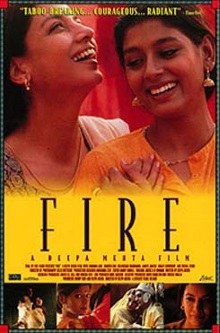
I wanted to watch this as I believe it’s a very important film in the history of Indian cinema though it seems to have been overlooked internationally. It was far ahead of its time when it was released and generated a huge amount of controversy, being not only about a homosexual relationship but attacking as it does fundamental aspects of Indian society. It’s also notable that its writer and director Deepa Mehta is a woman.
Sita is married to Jatin through the traditional arrangement without first knowing one another. She soon realizes that Jatin does not love her at all and in fact still sees his long-time girlfriend Julie who is Chinese. They live together with Jatin’s elder brother Ashok and his wife Radha, with downstairs section being the shop where they sell food and rent videotapes. Also living there are Ashok and Jatin’s mute mother Biji and their servant Mundu. With Jatin being emotionally distant and Ashok being constantly away with Swamiji, a local Hindu preacher, Sita and Radha grow close to one another. She learns that as Radha is barren and Ashok believes that sex should only ever be for the purpose of procreation, they have not been intimate for well over a decade. As the two confide and commiserate with each other, they eventually become lovers. Knowing that their relationship would be regarded as profane, they plan to run away so that they can be together as a couple.
I knew this would be a film involving a lesbian couple going in but I was still surprised by how many other controversial elements are present. One scene reveals that Mundu secretly watches the pornographic videotapes that Jatin rents out to special customers while he is supposed to take care of Biji. Being mute Biji is unable to say anything about it to her family members. Then there’s how Jatin’s Chinese girlfriend is content to be with him but refuses to be pulled into a traditional Indian marriage. Her father even turns out to be blatantly racist against Indians and goes on about their toilet habits. Or how Ashok religious devotion drives him to grow closer to Swamiji than any of his own family members. Or even Biji silently judging everything that she sees. There’s a lot going on in this film with plenty of detail about every layer of life in India.
Unfortunately while the director has courage and vision in spades, her craftsmanship in evidence here leaves something to be desired. The scenes involving Sita and Radha are clearly meant to be passionate but even after making allowances for decorum and tastefulness, they’re more of a damp squib than a sizzler. The actors do their best but the performances here still feel stilted and restrained. The various scenarios here look good on paper but on screen the actors feel so emotionally distant that they leave much of an impression on the audience. In particular I don’t feel that the progression of Sita and Radha’s relationship as shown here makes it plausible that running away from the family and all of the social rules that they have known their whole lives would be something that they would do.
The director has repeatedly stated that this shouldn’t be considered as a lesbian film and indeed I don’t believe that either Sita or Radha here should be seen as lesbians in the normal sense. They actually seem sexually attracted to men but have become intimate with each other out of frustration and the lack of intimacy in their relationships with their respective male partners. I don’t think it’s a fair portrayal of homosexuality to have the characters become lesbians due to their situation instead of being born with it. In their situation, I think it would make sense for them to be more intimate with each other than their usual social ties would warrant but having them consider each other as romantic partners seems really odd. It makes them willing to brave the social stigma and the difficulty of not having livelihood to run away together seem even weirder.
Overall I think this is a film by a director that means well and is very courageous. Given the date of its release, it has its place in the history of Indian cinema for these reasons alone. But as a film, it’s decent and watchable but I don’t think it’s all that great.